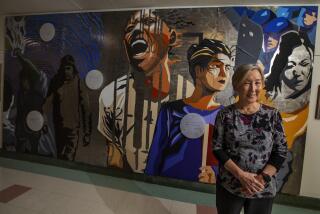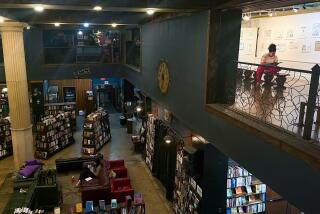A charming hideaway for rare-book lovers
- Share via
Tom Lolis, who studies English literature, was looking through volumes of religious writings at the William Andrews Clark Memorial Library last fall when he came across something unexpected.
It was a manuscript by British theologian John Portage, written around 1660. Portage’s work has been much studied by scholars, including Lolis. But here was a document that none of them knew existed.
“I kind of lucked out,” said Lolis, who is working on a post-doctoral fellowship at the library.
Many feel the same way when they discover the rare-book library, which is run by UCLA but located in Jefferson Park. Brick walls hide it from passersby, and most UCLA undergraduates have never heard of it.
But those who know the library say it is unmatched and unforgettable. “The Clark Library is the greatest unknown literary treasure in Los Angeles,” said Kathleen Thompson, who with her husband owns Michael R. Thompson Booksellers, a rare bookshop that works closely with the institution. “The minute we saw it 40 years ago we fell in love with it, and our love has only grown.”
The library was built in 1924 for the personal collection of Los Angeles philanthropist and bibliophile Williams Andrews Clark Jr. He named it for his father, a wealthy Montana banker and copper baron who served a term in the U.S. Senate.
Many details of the library reflect the younger Clark’s personal style and history. The bookcases in the reading rooms include copper mined by his family. Clark, who loved chamber music and founded the L.A. Philharmonic, had the drawing room designed to hold concerts.
Clark’s taste gave the building and its five-acre grounds a unique charm that remains today. Original furniture manufactured in 1920s Pasadena stands in the reading rooms, and a grand piano occupies the drawing room. Throughout the building, paintings personally commissioned by Clark hang on the walls. Outside, carefully trimmed gardens and statues invite readers to pause in their studies.
Clark’s influence also appears in the books themselves. Experts say his foresight is a major reason the library continues to stand out. Instead of hunting the most sought-after Elizabethan texts, he focused on later writers such as John Dryden and Oscar Wilde.
The collection — which has grown to include 110,000 rare books and a large archive of manuscripts and documents — draws researchers from around the world, said Bruce Whiteman, the head librarian. Scholarship is very much a part of Clark’s legacy, Whiteman said.
“Clark wasn’t one of those collectors who treated his collection as personal property; he responded openly to scholars who wanted to study his books. In that sense, you see why he gave the library to a public institution.”
In 1926, Clark donated the collection (then around 13,000 books) and the library grounds, along with a $1.5 million endowment, to the Southern Branch of the University of California, which later became UCLA. The school assumed full control when Clark died in 1934. His will contained only one restriction — that books could only leave the library for repairs.
The endowment covers book purchases and library maintenance, while UCLA pays staff salaries.
The library is open to the public, but readers must register and provide photo identification. On a typical day, 10 to 12 people visit, Whiteman said. Summers are the busiest time because that’s when scholars from other universities are free to travel.
Each year, the library hosts a visiting professor who plans a series of literary conferences, and offers several graduate fellowships. The library also produces a winter concert series.
Dr. Paul Chrzanowski certainly liked it. A nuclear physicist at the Lawrence Livermore National Laboratory, Chrzanowski spent years building up a Shakespeare collection, the playwright’s works as well as texts he may have read. The collection grew to 72 books, published between 1479 and 1731. It was appraised at just under $2 million.
In 2009, Chrzanowski decided to donate it to the Clark Library.
“It just felt right,” he said.
More to Read
Sign up for our Book Club newsletter
Get the latest news, events and more from the Los Angeles Times Book Club, and help us get L.A. reading and talking.
You may occasionally receive promotional content from the Los Angeles Times.






